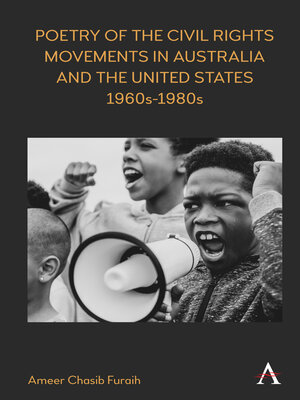Poetry of the Civil Rights Movements in Australia and the United States, 1960s–1980s
ebook ∣ Anthem Studies In Australian Literature and Culture
By Ameer Chasib Furaih

Sign up to save your library
With an OverDrive account, you can save your favorite libraries for at-a-glance information about availability. Find out more about OverDrive accounts.
Find this title in Libby, the library reading app by OverDrive.



Search for a digital library with this title
Title found at these libraries:
| Library Name | Distance |
|---|---|
| Loading... |
This book examines the poetries of two Aboriginal Australian poets, namely Oodgeroo Noonuccal (formerly Kath Walker; 1920–1993) and Lionel Fogarty (1958– ) and two African American Black Arts poets , namely Amiri Baraka (formerly Everett LeRoi Jones; 1934–2014) and Sonia Sanchez (1943– ) to demonstrate their role in the struggle for civil and human rights of their peoples from the 1960s. The book demonstrates commonalities and differences in the strategies of these poets' literary and political resistance. These poet-activists, though ethnically diverse and geographically dispersed, share comparable socio-political concerns and aspirations. Their activism is not a reflection of a single ideological current, but a bricolage of many ideologies and perspectives. They have engaged in trans-Pacific political movements and transgressed the borders of any one ideological territory. It is important to establish Aboriginal and African American trans-Pacific communication because these poets have collaborated and engaged in global politics (whether in the form of Garveyism or the "transnation"). Their poetries are characterized by an irresistible drive towards international rhizomatic collaboration and engagement. This is a transcontinental literary influence exerted by African American poets on Aboriginal poets during the 1960s and beyond.
|The book scrutinizes the poetries of Oodgeroo Noonuccal (1920–1993), Lionel Fogarty (1958– ), and Amiri Baraka and Sonia Sanchez (1943– ), focusing on their relatively comparable sociopolitical, and literary concerns and aspirations, though they are ethnically diverse and geographically dispersed. What I have attempted to do here is an integration of their idiosyncratic differences. This objective is grounded upon the fact that the role of poetry in this struggle and the international connections between the political movements in which these poets were involved have been overlooked in historical narratives of Australia and the United States, although Aboriginal and African American representation in the political narratives did improve during the 1960s. In fact, these poets not only merged writing poetry with a commitment to their peoples' political activism, but also actively participated in their peoples' political activism. They collaborated with other civil rights activists and participated in rallies and demonstrations. Sanchez and Fogarty are still involved. In their poetries, they recorded their peoples' pathos, injustices, social needs and political aspirations. Therefore, the book's confluence of poetics and politics is original because it aims to demonstrate how these poets voice the demands of their peoples, and how they use their poetries to reflect the realities they experienced during this period. Additionally, the book demonstrates how these poets resist cultural and linguistic hegemony and how they adapt their peoples' cultures and languages in their poetries to oppose literary universalism.
Instead of tracing the general development of Aboriginal and African American poetries during this period, I narrow the scope of my research to the poetries of these four selected poets, placing their works in broader, international contexts by drawing trans-Pacific connections between their poetries. The contribution of this book lies in its study of poetic intertextuality and common themes, and in the evaluation of the impact (direct or indirect) of African American poets, particularly those of the Black Arts movement, upon Aboriginal poets. Thus, the book should be seen as a starting point, rather than the final word on transnational exchanges between these movements. It should be...







